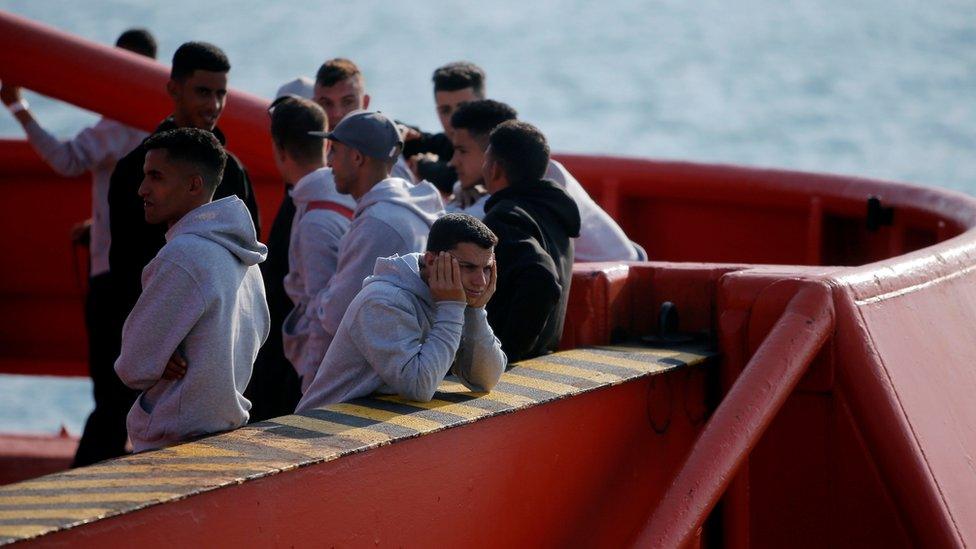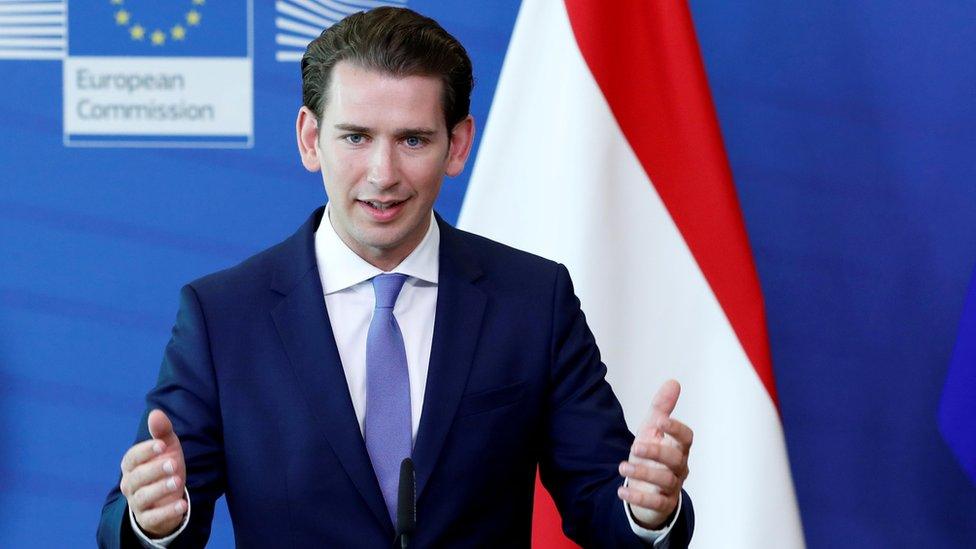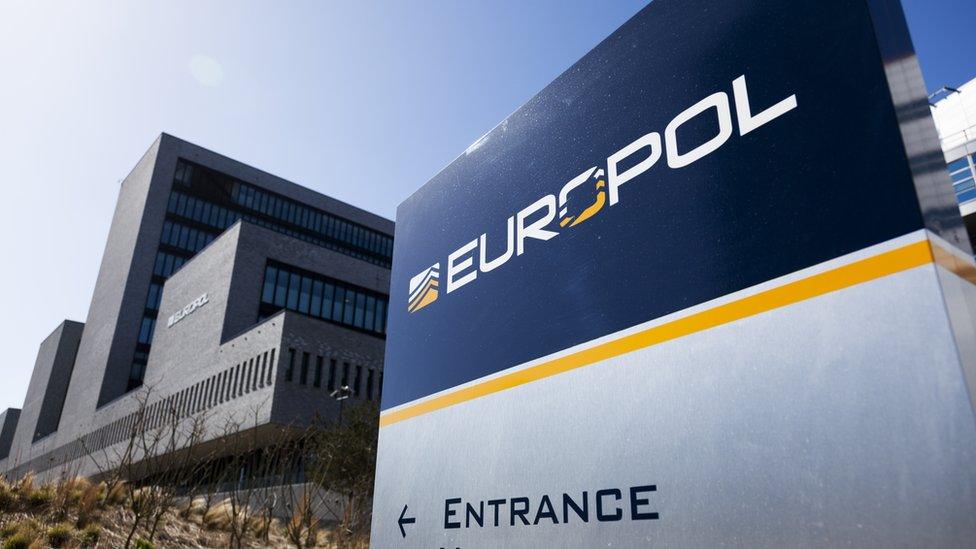Week ahead in the European Parliament
- Published

MEPs gather again in Strasbourg this week, where it could be a case of the plenary after the late night-summit before.
They will get the chance to pick over last week's deal on migration when the results of the summit are debated on Tuesday afternoon.
Some have already been quick to dismiss it as vague, with questions remaining over how the desired migrant processing centres will be implemented.
There are bound to be more calls to reform the EU's Dublin regulation, requiring migrants to be considered for asylum in the first safe country in which they arrive.
MEPs took their position on a proposed overhaul of the rules last November, but disagreement among EU countries means the process is stalled.
The leaders of Austria, Bulgaria and Poland will all get the chance to argue their case directly to MEPs this week with speeches in the hemicycle.
Austrian Chancellor Sebastian Kurz will speak after Bulgarian PM Boyko Borissov on Tuesday morning, as his country takes over, external the rotating EU presidency.
Polish PM Mateusz Morawiecki will make a speech about the future of the EU on Wednesday morning.
He could face something of a tough crowd - with Warsaw having clashed with Brussels over migrant quotas and proposed changes to its judiciary.
Here are the main events coming up this week...
Monday
The opening of the sitting could see an early effort to force a vote later in the week on controversial changes to EU copyright law that didn't make it onto the agenda.
If at least 76 MEPs object to a committee decision last month by midnight on Tuesday, a vote will be held on Thursday (read on for more).
At the least, Monday could provide the rebels with a chance to show their numbers, as this is when the committee decision will be formally announced.
In any case, the first scheduled debate is on a €500m industrial research fund for European defence companies.
The two-year fund was announced last year as part of plans to increase military co-operation between EU members.
MEPs have agreed a deal on the legislation setting up the fund, which will be put to a final vote on Tuesday.
Projects will have to involve at least three different firms established in at least three member states to be eligible for funding.
Later they will debate a committee report calling on the EU to recognise the traditional right of indigenous peoples develop their lands.
Recognition of traditional land ownership is seen as a way to protect such groups from the effects of 'land grabbing' from foreign firms and governments.
After this there's another committee report, this time on tackling "early" and forced marriages around the world.
The report also contains a call for all EU countries to set 18 years old as a uniform minimum age for marriage.
People can get married aged 16 in various parts of the EU - although often this requires parental permission.
Then come two debates on the EU's role in climate diplomacy and a meeting of the UN General Assembly in September.
The day finishes with presentations of two policy reports, including one urging the EU to consider changes to copyright laws to anticipate the rise of 3D printing.
Tuesday
In the morning the leaders of Bulgaria and Austria will make speeches during debates reviewing and previewing their respective EU presidencies.
Austria has said tackling illegal immigration will be one of it top priorities - and the speech from its chancellor Sebastian Kurz will be one to watch.

Sebastian Kurz advocates setting up asylum-processing centres outside the EU
The day's voting session includes a vote on approving €9.8m in EU grants for France to help put in place retrain workers made redundant by Air France.
The debate on last week's big EU leaders' summit kicks off the afternoon session from 14.00 BST.
Both European Council President Donald Tusk and EU Commission President Jean-Claude Juncker are due to speak during the debate.
After this comes a debate on controversial new EU rules on rest periods for lorry and truck drivers.
MEPs will adopt their initial position on a proposed overhaul of the rules on Wednesday, teeing up negotiations on the matter with EU governments.
A requirement in the original plans to make drivers return to their home country to take rest period every three weeks has attracted much opposition from haulage firms in central and eastern Europe.
After this comes a debate on a different migration crisis - the one affecting countries near crisis-hit Venezuela.
Colombia says more than 600,000 Venezuelans have crossed the border in recent years, mostly illegally.
Later MEPs will debate guidance for implementing anti-smuggling rules which allow sanctions on people who assist people to illegally enter the EU.
The 2002 facilitation directive contains an optional exemption allowing governments to waive sanctions for those providing "humanitarian assistance".
MEPs on the justice committee have asked for clarification in how the law should be applied, warning it has had "unintended consequences".
The matter goes right to the heart of a heated debate about whether NGOs that rescue people from the seas around Europe are operating as 'migrant taxis'.
The day will finish with debates on the legal definition of smaller businesses and an EU partnership agreement with Armenia.
At midnight comes a deadline for forcing a vote on Thursday on changes to EU copyright laws which some say could change the nature of the internet.
A committee of MEPs backed two controversial elements of the overhaul last month, during a vote to open negotiations with national ministers.
The first involves making internet companies put in place filters to detect potential copyright infringements in material uploaded by users.
The second would require online platforms to pay publishers a fee if they link to their news content - decried by opponents as a "link tax".
If more than 76 MEPs object to the committee's position by midnight, it will be put to a full vote on Thursday.
If the committee's position goes on to be rejected, will re-open debate on the law and potentially set up a full showdown in September.
Expect social media to be thrumming with the various activist groups who are trying to convince MEPs to throw out the legislation.
Wednesday
The debate with Polish Prime Minister Mateusz Morawiecki will begin at 08.00 BST, and last until voting gets underway at 10.30 BST.
He could use the occasion to comment on his country's ongoing tussle with Brussels over whether changes to the judiciary threaten the rule of law.
The voting session could see MEPs give final approval to changes to election rules for the European Parliament.
EU government have already backed the update, which extends a 2-5% threshold to enter the assembly for countries that have more than 35 MEPs.
The rule changes, which must be applied from 2024 but can be applied before then, may make it harder for very small parties to win seats.
They could also give initial backing to extending the regulatory powers of the European Central Bank (ECB) over clearing houses that deal with euro-denominated contracts.
The right of the ECB to regulate the activity of financial institutions outside the eurozone has become a flashpoint with the UK and in Brexit talks.
However this vote is an opening volley, and any changes will need to be agreed with national ministers before they can come into force.
They will also vote on advisory resolutions on security data-sharing agreements the EU is hoping to negotiate with eight Middle Eastern countries.
Earlier this month national ministers backed, external a European Commission proposal to negotiate agreements with eight countries, including Turkey and Egypt.

The UK also wants an agreement with Europol for after Brexit
The agreements would allow the countries to exchange information with Europol, the EU's police co-ordination agency.
The motions will set out MEPs' concerns about such agreements, and are likely to demand high standards of data protection.
Somewhat unusually, the voting session will be split into two parts to allow a speech from Angolan President Joao Lourenco.
The afternoon session begins with a debate on the imminent end of Greece's third bailout programme, due to finish in August.
After this comes a debate called by the Green group on comments on Roma made recently by new Italian interior minister Matteo Salvini.
Mr Salvini sparked outrage when he called for a census of the Roma population which would lead to non-Italians being deported.
In the evening, MEPs will debate their opening position on negotiations for next year's EU budget, and the adequacy of data protection safeguards in the EU's Privacy Shield data transfer pact with the United States.
Thursday
The morning sitting will begin with a debate on helping people with disabilities take part in European Parliament elections.
After that there will be short debates and votes on three human rights motions, this month relating to Moldova, Somalia and Burundi.
There will also be votes on a bevy of motions relating to debates held earlier in the week, on migrants, Venezuela and the 2019 EU budget.
There will also be a final vote on legislation introducing a new electronic authorisation system for non-EU nationals entering countries in the Schengen passport-free area.
The system will be used by nationals of those countries which are outside the EU but have an agreement with the bloc allowing their citizens to travel without applying for a full visa.
The new system, which was first proposed back in 2016 in a bid to increase security at the Schengen zone's external borders, is meant to be operational by 2021.
Please note: This agenda is subject to modification at the opening of the session on Monday afternoon.
A guide to the European Parliament's plenary sessions can be found here.